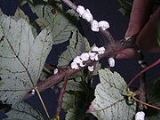
Pulvinaria innumerabilis
Encyclopedia
Pulvinaria innumerabilis (cottony maple scale) is a small, flattened, brown scale insect
about 1/8" long. In early summer mature females begin to secrete white, waxy, cottony-appearing egg sacs in which they lay as many as 1,500 eggs. Severely infested trees look like they are covered with strings of popcorn.
P. innumerabilis can be found on all species of maples (Acer spp.) but have a strong preference for Silver Maple
. It is also known to be able to survive on honey
and black locust
, white ash
, Euonymus
, oak
, boxelder, dogwood
, hackberry, sycamore
, beech
, elm
, willow
, basswood, and poplar
.
Scale insect
The scale insects are small insects of the order Hemiptera, generally classified as the superfamily Coccoidea. There are about 8,000 species of scale insects.-Ecology:...
about 1/8" long. In early summer mature females begin to secrete white, waxy, cottony-appearing egg sacs in which they lay as many as 1,500 eggs. Severely infested trees look like they are covered with strings of popcorn.
P. innumerabilis can be found on all species of maples (Acer spp.) but have a strong preference for Silver Maple
Silver Maple
The silver maple —also called creek maple, river maple, silverleaf maple, soft maple, water maple, or white maple—is a species of maple native to eastern North America in the eastern United States and Canada...
. It is also known to be able to survive on honey
Honey locust
The Honey locust, Gleditsia triacanthos, is a deciduous tree native to central North America. It is mostly found in the moist soil of river valleys ranging from southeastern South Dakota to New Orleans and central Texas, and as far east as eastern Massachusetts.-Description:Honey locusts, Gleditsia...
and black locust
Black locust
Robinia pseudoacacia, commonly known as the Black Locust, is a tree in the subfamily Faboideae of the pea family Fabaceae. It is native to the southeastern United States, but has been widely planted and naturalized elsewhere in temperate North America, Europe, Southern Africa and Asia and is...
, white ash
White Ash
For another species referred to as white ash, see Eucalyptus fraxinoides.Fraxinus americana is a species of Fraxinus native to eastern North America found in mesophytic hardwood forests from Nova Scotia west to Minnesota, south to northern Florida, and southwest to eastern...
, Euonymus
Euonymus
Euonymus , often called spindle or spindle tree, is a genus of flowering plants in the staff vine family, Celastraceae. It comprises about 170–180 species of deciduous and evergreen shrubs and small trees...
, oak
Oak
An oak is a tree or shrub in the genus Quercus , of which about 600 species exist. "Oak" may also appear in the names of species in related genera, notably Lithocarpus...
, boxelder, dogwood
Dogwood
The genus Cornus is a group of about 30-60 species of woody plants in the family Cornaceae, commonly known as dogwoods. Most dogwoods are deciduous trees or shrubs, but a few species are nearly herbaceous perennial subshrubs, and a few of the woody species are evergreen...
, hackberry, sycamore
Sycamore
Sycamore is a name which is applied at various times and places to three very different types of trees, but with somewhat similar leaf forms....
, beech
Beech
Beech is a genus of ten species of deciduous trees in the family Fagaceae, native to temperate Europe, Asia and North America.-Habit:...
, elm
Elm
Elms are deciduous and semi-deciduous trees comprising the genus Ulmus in the plant family Ulmaceae. The dozens of species are found in temperate and tropical-montane regions of North America and Eurasia, ranging southward into Indonesia. Elms are components of many kinds of natural forests...
, willow
Willow
Willows, sallows, and osiers form the genus Salix, around 400 species of deciduous trees and shrubs, found primarily on moist soils in cold and temperate regions of the Northern Hemisphere...
, basswood, and poplar
Poplar
Populus is a genus of 25–35 species of deciduous flowering plants in the family Salicaceae, native to most of the Northern Hemisphere. English names variously applied to different species include poplar , aspen, and cottonwood....
.

